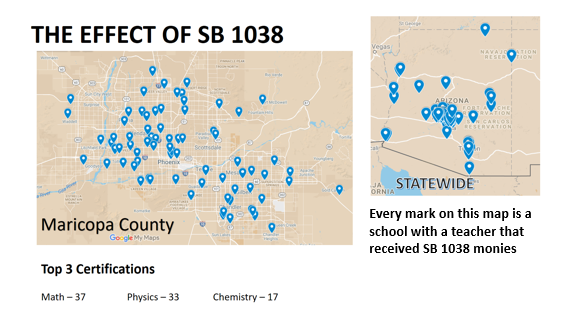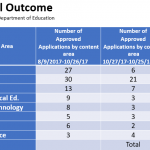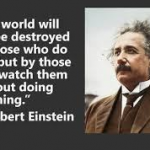In 2016 a small band of physics teachers got together to address the problem of a rapidly dwindling supply of qualified physics teachers in the state of Arizona. This team took it upon themselves to go straight to the capitol with data and facts and beg for help. The result was a piece of legislation called AZ SB 1038 – The Teachers Professional Development Pilot Program. This bill allocated 300,000$ to give science teachers across the state 2000$ scholarships of seed money to go out and re-certify into STEM subjects higher than their current level. The money for this endeavor ran out quickly and we saw 150 teachers statewide take advantage of this incredibly rare opportunity. What we hoped was to take a chip out of our STEM deficient. What we didn’t expect was the cascade effect of this program and how this very small state allocation has started to cause a ripple effect that would eventually take our team to Washington DC.
When our data started coming back we were a little upset that so many math teachers gobbled up scholarship money. In an effort to get the bill over the finish line we had to agree to include CTE and other STEM fields. Seeing that all of us who pushed the bill were mostly physics teachers, we were hoping to help physics and chemistry as the main disciplines, but once we learned a large number of teachers were using the funds to go out and get dual enrollment certifications in calculus and other pre-college level types of classes…. Our fears were diminished and we started to see a bigger picture emerge. I mean how can you be mad at people willing to get calculus certified? We soon realized that there is a massive need for access for teachers to get professional development in the upper-level sciences. I know we kind of already knew this, but without that financial backing component for most folks, going back to school is just a dream. To ask someone to take a calculus or physics class is hard enough as it is. Especially if you’re already teaching and you have family at home. Believe me, I know….. Then to ask that person to pay tuition to do it with no incentives is a tough sell.
As data has trickled in this past year we learned about scholarship recipients in some of the most rural parts of our state. Places you don’t ever think of as a city dweller. What that scholarship impact can have on a community is game-changing. Imagine whole communities now being able to offer upper-level science where before there was none. That kind of progress helps everyone, but what really was the most encouraging was our initial data that said we had 33 new teachers willing to commit to obtaining a physics certification. When you only have 158 left in the state, a 20% increase in your numbers is a hopeful start. When we started this process 2 years ago we always said our goal was to double our numbers in 5 years. The question now is, can we maintain a 20% growth rate?
With more data still coming in, we are seeing real progress and with that uptick, our team decided this past school year to become quasi-official and call ourselves the Cactus Caucus. Soon our group grew the attention of folks back east and in spring we applied for a fellowship thru the American Institute of Physics and the American Association of Physics Teachers.
With the Institute’s help, a fellowship was created that brought teams from all over the country to Washington DC to study public policy of physics education in America. The Cactus Caucus participated and brought what we had learned in our state to this first of hopefully more future conferences. We shared our successes and our failures and thanks to our new friends and allies in DC, we were able to look at ways to collaborate and expand what we are doing to push our cause of physics equity across the country as well as our home state of Arizona.
With the next legislative session looming we are hoping to convince lawmakers to expand the program for an additional 4 years if not make it a permeant line item in the budget. It is our hope that this effort will be able to put a small dent into our upper-level STEM deficit problem. The fact that national science organizations took notes and are using our effort as a research subject, speaks volumes about what this team is doing. Replication of our efforts would be a dream come true, and now with new found resources and expertise, we hope to try again and get part 2 of this program across the finish line in the state legislature this next session.
In the end what we walked away with most was the idea that you can engage in politics and public policy without being partisan. Lawmakers are not always as scary as they seem, and that a small band of dedicated people can still make an impact on public policy. I am hopeful that our story will be the begging of other STEM teacher’s journeys across the country to improve our profession and educational outreach. Thank you to the American Institute of Physics, the American Physics Teachers Association, and the National Science Foundation for investing in us and ultimately our kids.










Comments 3
Mike, I think your efforts here have been so amazing. I’m glad to hear that you are continuing to advocate for the expansion of the program. I’m very curious about your plans to advocate for the expansion. Best of luck! Clearly, our state needs it!
Thanks Beth, We are hoping to extend the program another few years. Ideally 5.
Our team has doubled in size since two years ago and we are pulling help from many different directions…
This is such an inspiring example of committed teachers owning a situation that might otherwise feel completely out of their control.